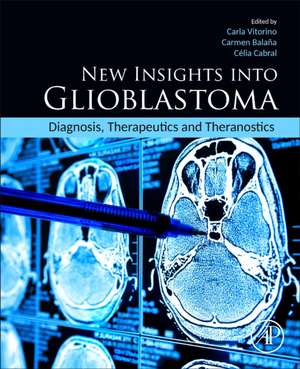New Insights into Glioblastoma: Diagnosis, Therapeutics and Theranostics
Editat de Carla Vitorino, Carmen Balana, Célia Cabralen Limba Engleză Paperback – 18 mai 2023
The book is split in three parts: Diagnosis, focusing on biomarkers and techniques such PET/MRI, infrared thermography, and deep neural networks; Therapeutics, discussing new chemical entities, as natural products and repurposed drugs, and new formulation approaches, as nanotechnology-based and microRNA approaches; and Theranostics, explaining the role of omics, system-based approaches, and glioblastoma microenvironment.
- Provides guidance towards recent advances of new chemical entities and delivery strategies targeted to glioblastoma
- Includes overviews to help readers apply information in their research
- Encompasses summarizing diagrams and real-world examples to facilitate comprehension and enhance the applicability of the content
Preț: 823.20 lei
Preț vechi: 1064.57 lei
-23% Nou
Puncte Express: 1235
Preț estimativ în valută:
157.57€ • 165.54$ • 132.42£
157.57€ • 165.54$ • 132.42£
Carte tipărită la comandă
Livrare economică 04-18 martie
Preluare comenzi: 021 569.72.76
Specificații
ISBN-13: 9780323998734
ISBN-10: 0323998739
Pagini: 786
Ilustrații: 130 illustrations (80 in full color)
Dimensiuni: 191 x 235 x 43 mm
Greutate: 1.6 kg
Editura: ELSEVIER SCIENCE
ISBN-10: 0323998739
Pagini: 786
Ilustrații: 130 illustrations (80 in full color)
Dimensiuni: 191 x 235 x 43 mm
Greutate: 1.6 kg
Editura: ELSEVIER SCIENCE
Cuprins
I. Introduction1 Introduction: A brief outlook into glioblastoma diagnosis and therapeutics
II. DiagnosisII.1 Biomarkers2. Practice guidelines for the diagnosis of glioblastoma3. Identification of potential biomarkers in glioblastoma through OMICS technologies and Big Data Analysis4. Forging a path to the use of liquid biopsy in the diagnosis of gliomas 5. Secretome analysis of patient-derived glioblastoma cells for potential biomarker identificationII.2 Techniques: updates6. Newly diagnosed glioblastoma: a review on clinical management7. Current status in brain glioma imaging (MRI, CT-Scan)8. Combined PET/MRI in brain glioma imaging9. New surgical approaches in glioblastoma10. The role of radiogenomics
III. TherapeuticsIII.1 New chemical entities11. An overview of molecular targeting of glioblastoma12. Terpenes: a hope for glioblastoma patients13. The artificial intelligence contribution to speed-up the active compounds screening14. Repurposing drugs in glioblastoma15. Glioblastoma heterogeneity and resistance: a glance in biology and therapeutic approach16. Targeting DNA damage response pathways in glioblastoma: from mechanistic insights to advances in the clinic17. Alkaloids: their relevance in cancer treatmentIII.2 New formulation approaches18. An overview of current drug delivery strategies for glioblastoma treatments and barriers to progress19. Nanotechnology-based approaches in glioblastoma treatment: how can the dual blood brain/tumor barriers be overcome?20. Non-coding RNAs in glioblastoma at a glance21. The role of vaccines in glioblastoma – updated clinical results22. Dendritic cells and glioblastoma23. Cancer stem cells in glioblastoma – an update24. Optimizing the role of immunotherapy for treatment of glioblastoma25. The role of exosomes in glioblastoma treatment
IV. Theranostics26. Theranostic in glioblastoma27. Potential theranostic targets in glioblastoma 28. Radiopharmaceuticals for molecular imaging and theranostics of glioblastoma29. Theranostic strategies synergistically potentiate glioblastoma treatment via nanotechnology30. The effect of glioblastoma microenvironment on theranostics
II. DiagnosisII.1 Biomarkers2. Practice guidelines for the diagnosis of glioblastoma3. Identification of potential biomarkers in glioblastoma through OMICS technologies and Big Data Analysis4. Forging a path to the use of liquid biopsy in the diagnosis of gliomas 5. Secretome analysis of patient-derived glioblastoma cells for potential biomarker identificationII.2 Techniques: updates6. Newly diagnosed glioblastoma: a review on clinical management7. Current status in brain glioma imaging (MRI, CT-Scan)8. Combined PET/MRI in brain glioma imaging9. New surgical approaches in glioblastoma10. The role of radiogenomics
III. TherapeuticsIII.1 New chemical entities11. An overview of molecular targeting of glioblastoma12. Terpenes: a hope for glioblastoma patients13. The artificial intelligence contribution to speed-up the active compounds screening14. Repurposing drugs in glioblastoma15. Glioblastoma heterogeneity and resistance: a glance in biology and therapeutic approach16. Targeting DNA damage response pathways in glioblastoma: from mechanistic insights to advances in the clinic17. Alkaloids: their relevance in cancer treatmentIII.2 New formulation approaches18. An overview of current drug delivery strategies for glioblastoma treatments and barriers to progress19. Nanotechnology-based approaches in glioblastoma treatment: how can the dual blood brain/tumor barriers be overcome?20. Non-coding RNAs in glioblastoma at a glance21. The role of vaccines in glioblastoma – updated clinical results22. Dendritic cells and glioblastoma23. Cancer stem cells in glioblastoma – an update24. Optimizing the role of immunotherapy for treatment of glioblastoma25. The role of exosomes in glioblastoma treatment
IV. Theranostics26. Theranostic in glioblastoma27. Potential theranostic targets in glioblastoma 28. Radiopharmaceuticals for molecular imaging and theranostics of glioblastoma29. Theranostic strategies synergistically potentiate glioblastoma treatment via nanotechnology30. The effect of glioblastoma microenvironment on theranostics
